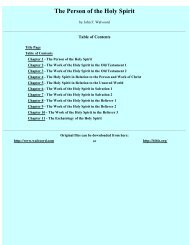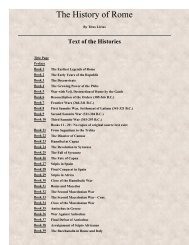Types in Hebrews - Table of Contents - Holy Pig Splash Page
Types in Hebrews - Table of Contents - Holy Pig Splash Page
Types in Hebrews - Table of Contents - Holy Pig Splash Page
Create successful ePaper yourself
Turn your PDF publications into a flip-book with our unique Google optimized e-Paper software.
To come, or draw near, is one <strong>of</strong> the "key words" <strong>of</strong> the Epistle. 2 It occurs first <strong>in</strong> the exhortation <strong>of</strong><br />
chapter 4:16, "Hav<strong>in</strong>g a great high-priest … let us draw near with boldness unto the throne <strong>of</strong> grace." As<br />
the tense <strong>of</strong> the verb <strong>in</strong>dicates, this is not an act to be done once for all, as when a s<strong>in</strong>ner comes to God<br />
for salvation; it is the habit <strong>of</strong> the true Christian, who is ever conscious <strong>of</strong> his need <strong>of</strong> mercy and grace.<br />
Still more pla<strong>in</strong>ly does this appear <strong>in</strong> chapter 7:25, where Christians are characteristically called, "comers<br />
unto God," draw<strong>in</strong>g near to Him be<strong>in</strong>g their normal attitude and habit. And the man <strong>of</strong> faith is similarly<br />
designated <strong>in</strong> chapter 11:6. In the open<strong>in</strong>g words <strong>of</strong> chapter 10, therefore, the worshipper is described as<br />
one who thus comes or draws near. And this same word is prom<strong>in</strong>ent <strong>in</strong> the exhortation <strong>of</strong> the twentysecond<br />
verse.<br />
The figurative language here employed - the blood, the veil, the spr<strong>in</strong>kled heart, the washed body - so<br />
perplex<strong>in</strong>g to Gentile exegesis, would be pla<strong>in</strong> and simple to the Hebrew Christian, for it is the language<br />
<strong>of</strong> the typology <strong>of</strong> that div<strong>in</strong>e religion <strong>in</strong> which he had been tra<strong>in</strong>ed. The Israelite, as we have seen, set<br />
out upon his journey to the land <strong>of</strong> promise as one <strong>of</strong> a redeemed and holy people. But, be<strong>in</strong>g none the<br />
less a s<strong>in</strong>ner, he was ever liable to fall; and though his s<strong>in</strong> did not put him back under either the doom or<br />
the bondage <strong>of</strong> Egypt, it necessarily barred his approach<strong>in</strong>g the sanctuary. His exclusion, moreover, must<br />
have been permanent if there had been no provision for atonement. And if this was true <strong>in</strong> relation to "a<br />
sanctuary <strong>of</strong> this world," how <strong>in</strong>tensely true must it be for us who have to do with the spiritual realities <strong>of</strong><br />
which that sanctuary was but a shadow. Therefore is it that <strong>in</strong> the teach<strong>in</strong>g <strong>of</strong> <strong>Hebrews</strong> "to make<br />
atonement 3 for the s<strong>in</strong>s <strong>of</strong> the people" is given such prom<strong>in</strong>ence <strong>in</strong> enumerat<strong>in</strong>g the priestly functions <strong>of</strong><br />
Christ. But <strong>Hebrews</strong> teaches <strong>in</strong> part by contrast; and whereas the Israelite had to br<strong>in</strong>g a fresh s<strong>in</strong><strong>of</strong>fer<strong>in</strong>g<br />
every time he s<strong>in</strong>ned ("because it is impossible that the blood <strong>of</strong> bulls and goats should take<br />
away s<strong>in</strong>s"), atonement for us is based upon the one great sacrifice which <strong>in</strong> fact accomplished what<br />
these typical <strong>of</strong>fer<strong>in</strong>gs were powerless to effect. And yet, I repeat, the need <strong>of</strong> atonement is deeper <strong>in</strong> our<br />
case than it was with the Israelite; and were it not for the work <strong>of</strong> our Great High-priest <strong>in</strong> the presence<br />
<strong>of</strong> God, our s<strong>in</strong>s as Christians would preclude our ever enter<strong>in</strong>g that holy presence dur<strong>in</strong>g all our life on<br />
earth.<br />
If a citizen be guilty <strong>of</strong> a crime, his conviction and sentence will dispose <strong>of</strong> the judicial question<br />
raised by his <strong>of</strong>fence; and yet if he formerly enjoyed the right <strong>of</strong> entree at the palace, noth<strong>in</strong>g short <strong>of</strong> a<br />
royal pardon will restore to him that privilege. This parable may serve to illustrate one aspect <strong>of</strong> the truth<br />
here <strong>in</strong> question. Although the believer has vicariously suffered the judicial consequences <strong>of</strong> his s<strong>in</strong>, that<br />
s<strong>in</strong> would none the less bar his ever aga<strong>in</strong> approach<strong>in</strong>g God, were it not that by confession and the<br />
aton<strong>in</strong>g work <strong>of</strong> Christ he obta<strong>in</strong>s forgiveness.<br />
But even though a citizen may have an acknowledged right to appear at Court, he may not enter the<br />
royal presence mud-splashed or travel-soiled; and wilderness defilement, even though contracted<br />
<strong>in</strong>nocently, precluded the Israelite from enter<strong>in</strong>g the sacred enclosure. And for this also there was full<br />
provision. But no special s<strong>in</strong>-<strong>of</strong>fer<strong>in</strong>g was needed. The unclean person was purged, first by be<strong>in</strong>g<br />
spr<strong>in</strong>kled with "the water <strong>of</strong> purification" - water that owed its efficacy to the great s<strong>in</strong>-<strong>of</strong>fer<strong>in</strong>g - and<br />
then by bath<strong>in</strong>g his entire body. The ritual is given <strong>in</strong> detail <strong>in</strong> Numbers 19. The victim was burnt to<br />
ashes. The ashes were preserved, and water that had flowed over them availed to cleanse. A s<strong>in</strong> required<br />
blood-shedd<strong>in</strong>g, defilement was purged by this water (<strong>Hebrews</strong> 9:13). And, as we have seen, the bloodshedd<strong>in</strong>g<br />
was the act <strong>of</strong> the man who s<strong>in</strong>ned; so here, no priest was needed; any clean person could<br />
perform the rite (Numbers 19:18), thus <strong>in</strong>dicat<strong>in</strong>g that the spr<strong>in</strong>kl<strong>in</strong>g and the wash<strong>in</strong>g are not the work <strong>of</strong><br />
Christ for us, but <strong>in</strong>dicate our own responsibility to seek the restoration <strong>of</strong> communion with God by faith








